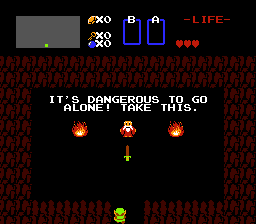
✅ What we’ll cover
After completing this lesson, you’ll be able to:
- Recognize the most helpful attitudes for approaching the class
- Develop a suite of planning tools that’ll help you succeed in this class (and others!)
- Design an individual learning plan for this class
Before we dive in to the content of this course, time for some metacognition.
Attitudes
This stuff is fun and exciting!
Seriously, it really is! I feel like this about all this stuff, and I hope you do, too.
New media is everywhere, and it plays a huge role in all of our lives. This class is a great opportunity to learn, talk, and understand more about some of the major forces that shape our world.
Here’s a big secret, though: even if you don’t think this stuff is thrilling and awesome, pretend like you do. Studies have shown 1 that acting like you like something can actually cause you to like it more. Would that be so bad?
There’s always more to learn!
This is an intro class, so for the most part, we’re going for breadth, not depth. However, please please please don’t stop there.
Not everything will interest you equally, but for the things that pique your interest, learn more—there are many, many lifetimes worth of learning you could do on any one of these topics, which, for the things you like at least, is a very, very good thing.
One other point on this topic: I don’t come close to knowing everything about everything I’ll talk about in this class. In fact, there’s a close to 100% chance that not only will I be wrong about things in this class and that you will know more about something than I do. That’s a good thing! It’s a stupid teacher cliché, but I really do love learning from my students, so if you spot a mistake or have knowledge to share, go ahead and share it with me—I’ll be grateful, I promise!
Connections and patterns beat facts and figures
Details matter up to a point, and it’s important to be intimately familiar with certain key terms, dates, names, etc.—and I’ll certainly do my best in this course to make sure that happens.
However, past that point, the connections between different concepts and the patterns you see repeated in what we discuss are far more important. Knowing things is important only insofar as it informs our ability to do things. Further, especially with new media, things move so fast that knowledge of specific technologies quickly becomes outdated. So, learn the key details, for sure, but focus on the big picture and trends.
Talk to people (each other, me, experts, etc.)

Learning on your own is fine—great even!—but learning together is the best. Sure, grades matter, but I really do want to, as much as possible, have fun learning this stuff together. So, talk to me (on Slack or on Twitter, or we can even set up a video call, if you’d like), talk to each other, and even be willing to reach out to cool, famous people related to what we’re learning.
Trust me, it’s so much more fun this way, and you’ll get so much more out of it, too.
Skills, tools, and practices
A searchable way to take notes + a scheduled time to review them
There are a gazillion different ways to take notes; hopefully at this point in your academic career, you’ve found one that works for you. If you have, great! Just be sure to apply it diligently in this course.
If you haven’t yet developed a note-taking system, try out a few different things in the early days of this course, paying attention to what works for you and what doesn’t. After the first five or six lessons, pick one method and stick with it for the remainder of the class.
Note-taking concept I: Make sure that your note-taking is a reflective practice. That is, you shouldn’t just be copying down everything the course covers. Rather, as you’re learning, use your notes as the first layer of filtering through what you’re taking in. Separate the wheat from the chaff, so to speak.
Note-taking concept II: Create a searchable, synced archive of your notes. If you prefer to use a digital note-taking tool, great! Even if you prefer paper, though, take the time to type your notes up using a digital notes app you like (I’m a pretty big fan of Apple’s built-in Notes app these days), and make sure it’s one that syncs across devices, so that a) your notes are at least somewhat backed up b) your notes are available anywhere c) you can take notes anywhere and d) you can review your notes anywhere. This leads nicely to…
Note-taking concept III: Review your notes! If you implement all of the other note-taking strategies I’ve outlined so far, you’ll already be worlds ahead of most students. However, if you don’t also review your notes, you’re leaving major—any easy!—gains on the table. Studies show that spaced review is one of the very best ways to improve learning.
Here’s the real trick about this, though: you’re straight up not going to do this. Seriously: it’ll never feel like the most important thing you have to do at the moment. How to overcome this? Schedule it. Assign this work to your future self 2 at a non-busy time of day, or when you know you’ll have down-time and not a lot of other options (riding the bus, etc.).
A centralized place to keep up with news + a way to save things for later
For more on this, see our class’s only extra credit opportunity, the Tech News Practice.
A way to manage your tasks and your time
This is really a broader adulting issue, but if you don’t have it licked, it’ll cause major problems for you in this course, so it’s worth discussing briefly.
In short, the fundamental concept is this: your brain is a tool for thinking about things, not for remembering what you need to do and when you need to do that. Use other tools to remember what to do and when to do it, and make a habit of using them all the time.
Outsource your to-do list to some sort of task app. There are so many that I won’t even bother recommending one, except to say two things. First, long experience has taught me that, at least for me, simple, ubiquitous (available on any device) tools beat complicated ones. Second, you must always write things down immediately when they occur to you; otherwise, there’s no point to doing this, because then you’ll just spend time trying to remember what you didn’t remember to write down.
Finally, for goodness’ sake, use a digital calendar: I use Google Calendar, but just out of habit—Apple’s calendar tools are great now, too, and I imagine there are plenty of other good ones, as well. In any case, any time you have anything due at a specific time, somewhere you need to be at a specific time, or really anything having to do with specific times, put in on your calendar. Do this regularly, and you’ll find your life to be calmer and more successful.
Postscript
If you want to talk with me further about any of these things, please do—I’m quite passionate about them and would love to help in any way I can. To reward you for your thorough reading, here’s a video of an otter eating lettuce:
I sincerely hope that this video of an otter eating lettuce brings peace and joy to your life pic.twitter.com/l6aLJL6ipT
— mean plastic (@meanpIastic) May 16, 2016
Discussion Questions
- How well do you think you’ll do with the attitudes this lesson asks you to adopt for this class? Be honest! Do they line up with how you typically approach classes? Or not?
- How’s your note-taking game coming into this class? Are you going to try anything new based on this lesson?
- How about time management?
- Finally, how do you keep up with the news about things you care about? Do you have a way to save things to read later?
Words on / reading time for this page: 1,452 words / 8-12 minutes
Words in / reading time for required readings: 0
Total words in / reading time for this lesson: 1,452 words / 8-12 minutes